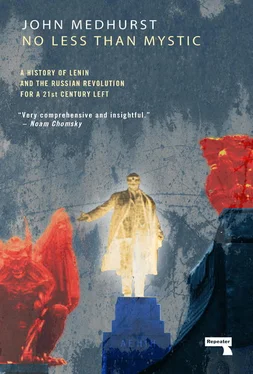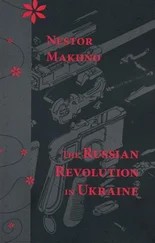The campaigns against Ukraine and Poland revived the sleeping virus of militaristic nationalism within Soviet Russia. It would gradually begin to define the entire system. From 1921 it was the Red Army, not ranks of factory workers, who led major ceremonial parades in Moscow and Petrograd, “thus signaling a certain heroic and moral hegemony of the armed forces over civilian society”. 8After Lenin’s death in January 1924, the trend to transform revolutionary leaders into revered nationalistic symbols took off in style with the 1924 May Day procession in Moscow. Rows of tanks and troops filed past Lenin’s recently constructed tomb, in which lay his embalmed corpse, whilst a squadron of airplanes flew overhead. In 1941, when the Nazis invaded the Soviet Union, Stalin would unambiguously call on Soviet citizens to fight a “Great Patriotic War”. The subsequent post-war expansion of Soviet power into Eastern Europe under the Warsaw Pact was a source of nationalistic pride to many Russians, especially the state elite, most of whom by the 1950s and 1960s could be described as National Bolsheviks.
With the close of the Civil War and the Polish-Soviet War Sovnarcom turned its attention to establishing Soviet Republics in the west (Latvia, Estonia and Lithuania), in Transcaucasia (Armenia, Azerbaijan and Georgia) and in the eastern borderlands and Central Asia. The “Conference of the Peoples of the East”, held at Baku in Azerbaijan in September 1920, opened up a new phase of Bolshevik policy towards former colonial possessions. The Conference was called by the Comintern and was attended by 1,900 representatives of Communist and anti-colonial parties from Persia, Turkey, Armenia, Azerbaijan, Georgia, Chechnya, and a variety of central Asian regions. It was addressed by Zinoviev, Radek, Bela Kun and John Reed. The “Manifesto of the Peoples of the East” adopted at the conference was intended mainly for the ears of Indian and other independence movements struggling against Western imperialist powers. It had less application to the USSR’s own subject territories, as the fate of the independent Republic of Georgia testified.
The Democratic Republic of Georgia was created in May 1918 when Georgia availed itself of Sovnarcom’s right of national self-determination and declared independence. In national elections held in February 1919 the Georgian RSDLP (i.e. the Mensheviks) won 81% of the vote and proceeded to establish a democratic socialist republic. Georgia’s Menshevik government rejected the Bolshevik route to socialism. It held multi-party elections. It allowed a free press and independent trade unions. The Mensheviks implemented in Georgia the land policy they had not had the chance to apply in Russia due to their minority status within the Provisional Government before October 1917, and the dissolution of the Constituent Assembly after it. The Georgian government broke up large estates and allowed Georgian peasants to buy up plots at generous prices. It also introduced the kind of progressive labour reforms that had gained Pilsudski the loyalty of Polish workers, and with the same result. In its brief life the Democratic Republic of Georgia secured the support of Georgian peasants and most of the working class of Tiflis.
In April 1920 Georgian Bolsheviks, following tactics successful in Armenia and Azerbaijan, attempted a coup in Tiflis that was intended to act as the pretext for the Red Army to invade Georgia to liberate its workers. But the coup had virtually no internal support and was easily defeated. Ronald G. Suny’s examination of the Georgian Menshevik government concludes that the reason the Mensheviks secured the loyalty of a majority of the population was because they adopted an approach entirely different from that of the Bolsheviks in Russia, which was “to mediate rather than intensify social conflicts, to keep as open as possible a political forum, both in the press and in elected institutions, and to use force minimally”. 9
The independent Republic of Georgia had wide support on the international left. This was one reason why Sovnarcom signed the Treaty of Moscow in May 1920 with the Georgian government, guaranteeing its independence. Despite this, senior officials of Stalin’s Nationalities Commissariat in the Caucasus, including his friend and sidekick Sergei Ordzhonikidze, continued to plan a coup in Georgia. Although Trotsky was strongly opposed to this, he was in a minority of one on the Politburo. The majority feeling was that the existence of a viable, popular democratic socialist government led by the Menshevik Party on Russia’s doorstep was intolerable.
Stalin and Ordzhonikidze continued to work covertly with Georgian Bolsheviks to stage a series of “uprisings” in outlying Georgian towns in early 1921, and give Moscow a pretext to intervene. On 14th February the Central Committee met and approved an invasion, with only Karl Radek dissenting. Trotsky, away at the time, was not informed of the meeting by the Secretariat. With the excuse that it was coming to the aid of Georgian workers, the Red Army invaded on 16th February. Trotsky was not even told the operation was about to commence. The small Georgian army, with the support of most of the Georgian working class, resisted the invading force for a fortnight, but it stood no chance against the much bigger Red Army.
The social and political system subsequently imposed upon Georgia was so severe that on 7th August, 1921 an appeal was issued signed by 3,449 Georgian workers, titled “The Appeal of the Tiflis Workers to All the Workers of Western Europe”. It read:
From the very first days Georgia was conquered, we were placed in the position of and treated as slaves. We were deprived of freedom of speech, assembly and the right of free association. A regime of military labour service has been imposed upon all the workers of Georgia, irrespective of their occupation. Everywhere Extraordinary Committees (Chekas) have been set up and summary arrests of workers for innocuous remarks have been taking place.
After cataloging the oppression being visited upon Georgian workers, the Appeal finished by proclaiming:
Human life has become of no value. Innocent people are shot, even those who never mixed into politics, who never took part in any political struggle. People were shot because they served the democratic government and the state, because in open war they defended their native country from the invasion of foreign troops. 10
The Western powers who intervened in Soviet Russia to assist the Whites greeted the suppression of a democratic socialist republic in Georgia with indifference. Karl Kautsky, who visited Georgia in late 1920 for three months, spoke for the democratic left with his book Georgia: A Social-Democratic Peasant Republic: Impressions and Observations (1921). Despite the immense difficulties under which it laboured–Georgia was at roughly the same level of social and economic development as Russia in 1917–Kautsky was impressed with the efforts of the Georgian Mensheviks to effect a social revolution: “It was left for the revolution to take the land from the feudal nobles, to provide the poor peasant with land, and to change the leaseholder into a freeholder. This was no socialistic but a middle-class revolution, but the conditions rendered it necessary, and it took place”. In Kautsky’s view, the course of the Georgian Revolution confirmed that the entire political and economic programme of the Bolsheviks was premature and excessive and could not be imposed except by state coercion.
By contrast the Georgian Revolution, which did not shrink from expropriating all large landowners’ estates, proceeded to create a mixed economy of peasant small holdings with state-owned enterprises, overseen by the state and local municipalities. The main strategic industries were nationalised with about a third of the economy left in private hands. A new economy of consumers’ and workers’ cooperatives was introduced to provide the space for different forms of ownership and economic management. Suggesting a slower but more practical route to socialism, not unlike that of Venezuela’s Solidaristic Economy, Kautsky suggested, “In those spheres where the monopolistic character of capital has scarcely made itself felt, the production carried on by organisations of consumers can create socialistic conditions of production, if these consumers’ organisations are dominated by the socialist outlook”.
Читать дальше












